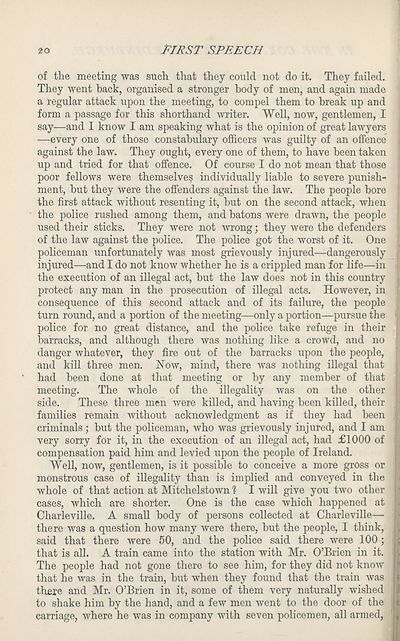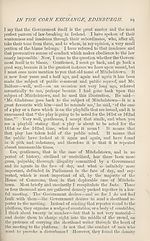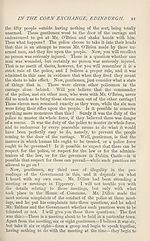Download files
Complete book:
Individual page:
Thumbnail gallery: Grid view | List view

20
PlRST SPEECH
of the meeting was such that they could not do it. They failed.
They went hack, organised a stronger body of men, and again made
a regular attack upon the meeting, to compel them to break up and
form a passage for this shorthand writer. Well, now, gentlemen, I
say—and I know I am speaking what is the opinion of great lawyers
—every one of those constabulary officers was guilty of an offence
against the law. They ought, every one of them, to have been taken
up and tried for that offence. Of course I do not mean that those
poor fellows were themselve? individually liable to severe punish¬
ment, hut they were the offenders against the law. The people bore
the first attack without resenting it, but on the second attack, when
the police rushed among them, and batons were drawn, the people
used their sticks. They were not wrong; they were the defenders
of the law against the police. The police got the worst of it. One
policeman unfortunately was most grievously injured—dangerously
injured—and I do not know whether he is a crippled man for life—in
the execution of an illegal act, but the law does not in this country
protect any man in the prosecution of illegal acts. However, in
consequence of this second attack and of its failure, the people
turn round, and a portion of the meeting—only a portion—pursue the
police for no great distance, and the police take refuge in their
barracks, and although there was nothing like a crowd, and no
danger whatever, they fire out of the barracks upon the people,
and kill three men. How, mind, there was nothing illegal that
had been done at that meeting or by any member of that
meeting. The whole of the illegality was on the other
side. These three men were killed, and having been killed, their
families remain without acknowledgment as if they had been
criminals; but the policeman, who was grievously injured, and I am
very sorry for it, in the execution of an illegal act, had £1000 of
compensation paid him and levied upon the people of Ireland.
Well, now, gentlemen, is it possible to conceive a more gross or
monstrous case of illegality than is implied and conveyed in the
whole of that action at Mitchelstown 1 I will give you two other
cases, which are shorter. One is the case which happened at
Charleville. A small body of persons collected at Charleville—
there was a question how many were there, but the people, I think,
said that there were 50, and the police said there were 100;
that is all. A train came into the station with Mr. O’Brien in it.
The people had not gone there to see him, for they did not know
that he was in the train, but when they found that the train was
there and Mr. O’Brien in it, some of them very naturally wished
to shake him by the hand, and a few men went to the door of the
carriage, where he was in company with seven policemen, all armed,
PlRST SPEECH
of the meeting was such that they could not do it. They failed.
They went hack, organised a stronger body of men, and again made
a regular attack upon the meeting, to compel them to break up and
form a passage for this shorthand writer. Well, now, gentlemen, I
say—and I know I am speaking what is the opinion of great lawyers
—every one of those constabulary officers was guilty of an offence
against the law. They ought, every one of them, to have been taken
up and tried for that offence. Of course I do not mean that those
poor fellows were themselve? individually liable to severe punish¬
ment, hut they were the offenders against the law. The people bore
the first attack without resenting it, but on the second attack, when
the police rushed among them, and batons were drawn, the people
used their sticks. They were not wrong; they were the defenders
of the law against the police. The police got the worst of it. One
policeman unfortunately was most grievously injured—dangerously
injured—and I do not know whether he is a crippled man for life—in
the execution of an illegal act, but the law does not in this country
protect any man in the prosecution of illegal acts. However, in
consequence of this second attack and of its failure, the people
turn round, and a portion of the meeting—only a portion—pursue the
police for no great distance, and the police take refuge in their
barracks, and although there was nothing like a crowd, and no
danger whatever, they fire out of the barracks upon the people,
and kill three men. How, mind, there was nothing illegal that
had been done at that meeting or by any member of that
meeting. The whole of the illegality was on the other
side. These three men were killed, and having been killed, their
families remain without acknowledgment as if they had been
criminals; but the policeman, who was grievously injured, and I am
very sorry for it, in the execution of an illegal act, had £1000 of
compensation paid him and levied upon the people of Ireland.
Well, now, gentlemen, is it possible to conceive a more gross or
monstrous case of illegality than is implied and conveyed in the
whole of that action at Mitchelstown 1 I will give you two other
cases, which are shorter. One is the case which happened at
Charleville. A small body of persons collected at Charleville—
there was a question how many were there, but the people, I think,
said that there were 50, and the police said there were 100;
that is all. A train came into the station with Mr. O’Brien in it.
The people had not gone there to see him, for they did not know
that he was in the train, but when they found that the train was
there and Mr. O’Brien in it, some of them very naturally wished
to shake him by the hand, and a few men went to the door of the
carriage, where he was in company with seven policemen, all armed,
Set display mode to:
![]() Universal Viewer |
Universal Viewer | ![]() Mirador |
Large image | Transcription
Mirador |
Large image | Transcription
| Antiquarian books of Scotland > Politics & government > Political speeches in Scotland in 1890 > (24) |
|---|
| Permanent URL | https://digital.nls.uk/126568578 |
|---|
| Description | Thousands of printed books from the Antiquarian Books of Scotland collection which dates from 1641 to the 1980s. The collection consists of 14,800 books which were published in Scotland or have a Scottish connection, e.g. through the author, printer or owner. Subjects covered include sport, education, diseases, adventure, occupations, Jacobites, politics and religion. Among the 29 languages represented are English, Gaelic, Italian, French, Russian and Swedish. |
|---|

